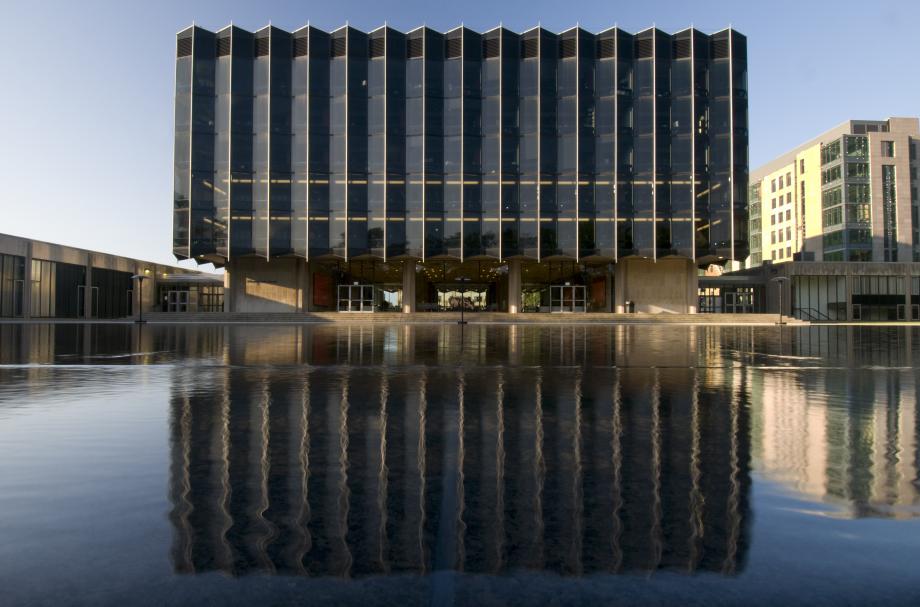Keeping Law in the Family Inspires Unrestricted Gift to the Law School

Daniel Levin, AB ’50, JD ’53, and his wife, Fay Hartog Levin, have made a substantial unrestricted gift to the Law School, partly in the form of current funds and partly as a bequest. In recognition of their gift, the reflecting pool in the Law School quadrangle has been named the Levin Reflecting Pool.
Mr. Levin founded and is Chairman of The Habitat Company, one of the larger residential developers in the United States, with more than 20,000 units under management and more than $2 billion in assets. Ms. Hartog Levin, whose background includes service as US Ambassador to the Netherlands, teaches at the Law School.
Coming from a family of lawyers—his father founded a Detroit firm and then served as a US District Court judge for 24 years, and his older brother served as a justice on the Michigan Supreme Court—Mr. Levin says that he was disappointed to realize after a year of clerking and a few years at the family firm that he didn’t much like practicing law. “I love the law, and my Law School experience was excellent,” he says. “I just didn’t enjoy practicing law, and I wasn’t particularly good at it. I’m not sure which came first, not liking it or not being very good at it, but whatever the reason, I didn’t see law practice as a career that would attract all my interest and energy.”
When a Chicago-based real estate developer invited Levin to join his company in 1957 as an in-house counsel, he gladly accepted the opportunity. “I came to love the real estate business, particularly residential properties, helping people and rebuilding communities,” he says. In the first brochure he wrote after forming The Habitat Company in 1971, he expressed the credo that guided him and still guides his company: “No project is only an investment in real estate. It is an investment in the future of the community and in the lives of the people who live and work there.”
In 1987, a court order placed Habitat in charge of developing and administering the Chicago Housing Authority’s scattered site and redevelopment program, responsible for carrying out a previous mandate that all new CHA housing be built outside of predominantly low-income African-American neighborhoods. Since then, Habitat has developed or overseen development of more than 4,000 units of CHA housing, and now manages more than 5,000 CHA units. The company’s other projects, in five different states, include senior housing, student housing, affordable housing, market-rate apartments and condominiums, and commercial properties.
Mr. Levin’s interest in building strong communities led him to a close relationship with the Harris School of Public Policy, where he has served on the visiting committee and on the Dean’s International Council and been a generous donor. “I thought it was appropriate to support a school that was dealing through the university with all the issues we face at Habitat,” he says. Among many other civic activities, he is vice chair of the board of directors of the Environmental Law and Policy Center and a trustee of WTTW, Chicago’s public television station.
Ms. Hartog Levin began her career as a legal advisor to the Illinois State Board of Education and then joined the law firm Seyfarth Shaw. In 1997, she became the Field Museum’s first Vice President of External Affairs, acting as the Museum’s liaison with federal, state, and local government agencies. At the Law School, she teaches the course “The Evolving Relationship between the Federal Government and the States.” She is also on the boards of the National Archives Foundation and the Roosevelt Institute.
Mr. Levin says, “It’s a thrill for me that my wife is serving on the faculty where I received a great educational experience from the likes of Ed Levi and Harry Kalven. Fay and I have vast respect for the Law School, for its intellectual rigor and its social commitment. We are honored to be able to give back in this way.”
Satisfying recognition also came to Mr. Levin last December, when all 23 members of his immediate family—his wife, their children and spouses, and their grandchildren—gathered from as far away as Paris for an early celebration of his 85th birthday.
The University of Chicago Campaign: Inquiry and Impact, the most ambitious and comprehensive campaign in the University’s history, will raise $4.5 billion to support faculty and researchers, practitioners and patients, and students and programs across the University. Launched in October 2014, the campaign supports priorities in every division, school, department, and institute, and aims to engage 125,000 alumni and friends over its five-year duration.